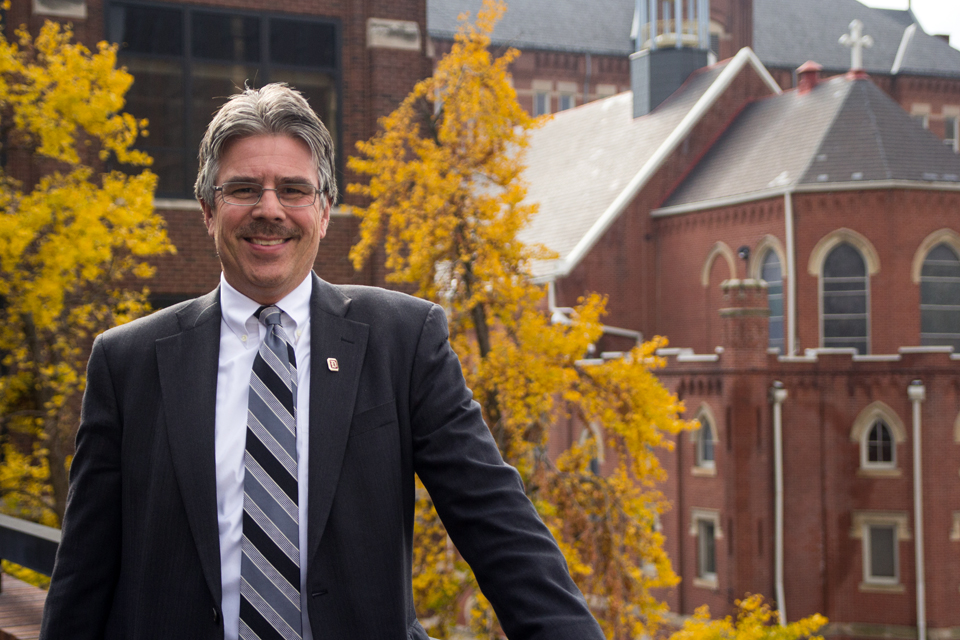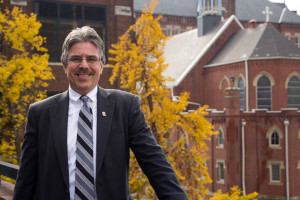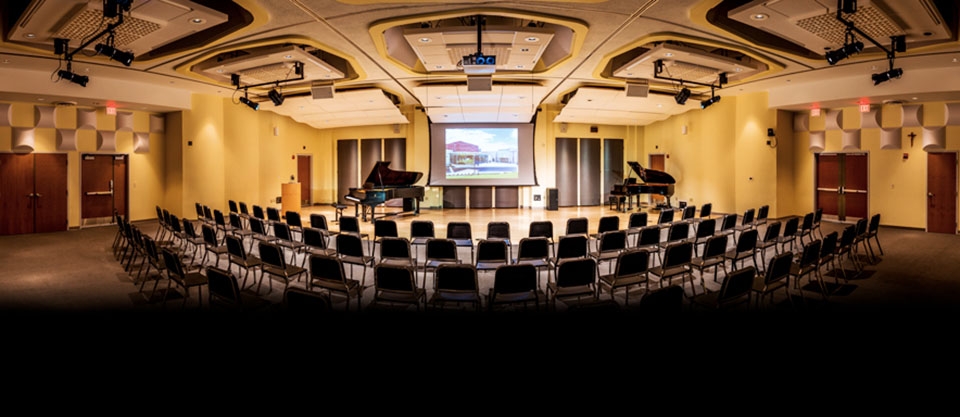

Law school Dean Ken Gormley poses for a photo Wednesday morning outside Old Main. Gormley was selected as the13th president of Duquesne University.
By Kaye Burnet | News Editor
Find the full text of The Duke’s interview with Dean Gormley here.
His favorite Disney princess is Ariel, he’s wrestled a bear and he never hits the snooze button.
No one can call law school Dean Ken Gormley boring. But in July, his life will become even more interesting when he succeeds Charles Dougherty as the next president of Duquesne University. Although the event is eight months away, Gormley said he has already started thinking about how to approach the challenges and duties of his next role.
As the 13th Duquesne president, Gormley said he intends to build connections between the university and community leaders, grow the university’s endowment, maintain Duquesne’s Catholic identity and bring the university more attention on a national scale. He will take over a university that is currently facing controversy over its treatment of adjunct faculty, the safety of its students and the availability of on-campus housing.
“I have learned over the years that I really enjoy these very big administrative challenges,” Gormley said.
As the adjunct issue is currently being battled in the courts, Gormley said he feels the university is right to treat the contention as a matter of religious freedom.
When Duquesne adjuncts voted to form a union under the United Steelworkers in 2012, the university refused to recognize the group. The university is currently appealing a National Labor Relations Board ruling that ordered Duquesne to recognize the union, arguing that Duquesne’s position as a Catholic organization makes it exempt from labor relations laws.
“I do teach constitutional law. I have read the cases that relate to this subject, [including] one case from the U.S. Supreme Court, and I do believe that the university is correct that there is a First Amendment free exercise of religion issue that is at the heart of this issue,” Gormley said.
“A Catholic or religious school is in a different position than other universities in terms of the adjunct professors or other professors that it hires,” he added.
As for campus safety, despite two violent crimes recently taking place on Fifth Avenue, Gormley said the university remains “dramatically safer than most college campuses in the United States.”
“We have a kind of natural oasis up here on the Bluff and that is very reassuring … I think we’re extremely secure and our police force is extremely good,” Gormley said. “That being said, I think it’s always important to keep looking at ways to strengthen the protection.”
During his time as law school dean, Gormley said he managed to teach multiple classes while organizing the largest fundraiser in the law school’s history. He said he hopes that experience will help him grow the university’s endowment while still remaining in touch with students.
“Fundraising is a key component of any university president’s job today,” Gormley said. “So that’s the plan: to help create new, exciting things going on on campus so that our alumni and people in the region can see that this place is alive and want to be part of everything that’s going on here.”
Gormley does have an uphill battle to fight in terms of school pride and enthusiasm. In response to comments made by current President Dougherty during a faculty meeting last month calling students who live off-campus “libertines” who are only interested in sex and alcohol, students, alumni and parents took to social media to express their displeasure with the university.
Several alumni threatened to avoid any future donations to Duquesne, while parents said they would not recommend the school to others. Many students feel there is a disconnect between the university’s administration and its students.
Junior economics major Tori Andrews, 20, said, “We came here to say we went to a reputable school, and now that reputation is being damaged by our own president.”
Gormley said he hopes to heal any rifts between students and the university’s leaders.
“I consider being able to work with students and help them develop into great, successful people and alumns, is one of the greatest privileges of this position,” Gormley said. “My goal is to be part of the everyday life of this institution, and the everyday life of this institution largely revolves around the students here. So I don’t think it will be possible to stop me from being involved with students.”


